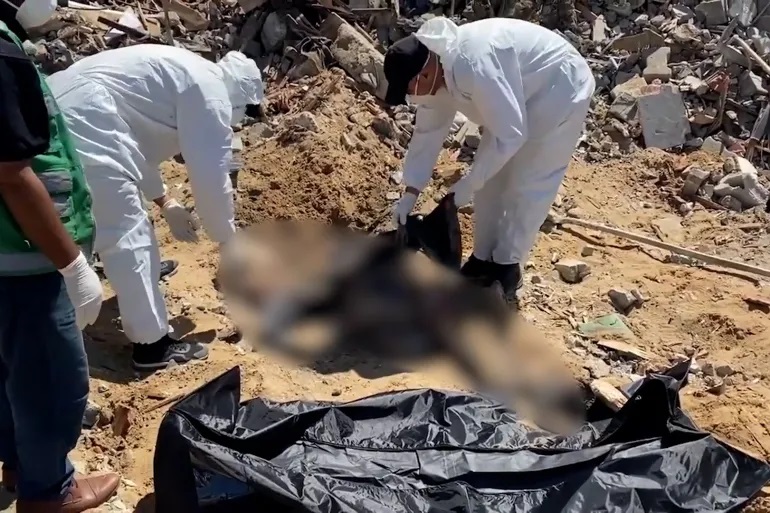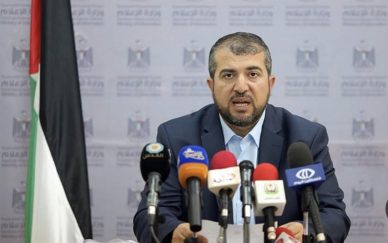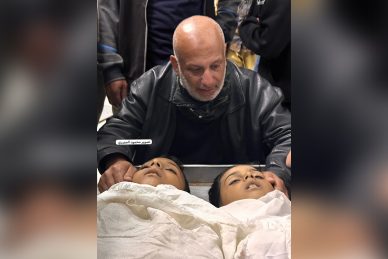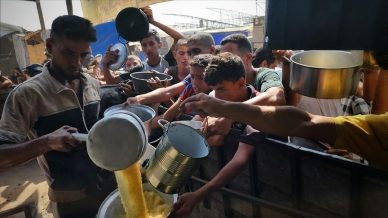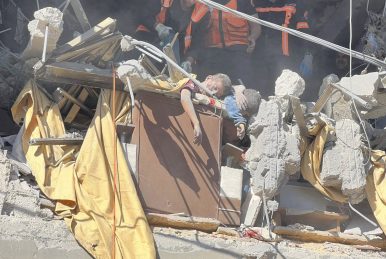GAZA, (PIC)
In the back courtyard of Al-Shifa Medical Complex, where the bodies of martyrs lie under the March sun, Um Jihad Al-Omrin stood, searching with her weary eyes for her only son. Five months have passed since his martyrdom, and she still does not know where he was buried. She came today, as she has for weeks, looking for a trace, a shirt she recognizes, a pair of beige shoes, or teeth that her eyes could not mistake.
“I know him well; I raised him alone for 33 years. He had no siblings, and he was my whole life,” she said in a trembling voice before sinking into a heavy silence, staring at the bodies laid out that have yet to find their graves.
Muhammad Hamdan: A man searching for his son’s body
In another part of Gaza, Muhammad Hamdan stands amid the destruction, staring at the rubble as if he hears a familiar voice. Since the bombing that targeted his home in the Al-Amal neighborhood in November 2023, life has lost its meaning for him. That bloody night, he lost his wife, children, father, mother, and even his brother’s family—all martyred. He is left with only one hope: to find the body of his son, Hamza.
He returns daily to the bombing site, sifting through the shattered stones, moving between hospitals, searching among the decomposing bodies, and asking rescue teams. He gazes at the photos of unidentified martyrs, but he has not yet found Hamza. With tears, he tells the Palestinian Information Center: “My heart is burning… I want nothing from this world, just his body. I want to bury him with my own hands.”
A massacre without graves
Since the war started on October 7, 2023, death in Gaza has not ceased. Um Jihad is not the only one here, and Muhammad Hamdan is not the only one searching for a missing loved one among the bodies. Families of dozens of martyrs gather daily in front of hospitals and cemeteries, looking for their children, wishing for a death less brutal, a grave worthy of their dignity, or even just a farewell.
The tragedy of the Abu Ajwa family
On the other side of the complex, shovels were digging through the rubble, but for the husband of the martyr Israa Ammar Abu Ajwa, digging was not enough. He removed the dirt with his bare hands, heedless of his wounds, searching for his wife and their four daughters: Nada (15 years), Rimas (13 years), Maryam (10 years), and Sara (9 years). They were all killed in an Israeli bombing that targeted their shelter next to Al-Shifa Hospital in November 2024. They were not alone under the rubble; the brother of the martyr, Ibrahim (30 years), was buried with them, turning their home into a mass grave.
A martyr with two legs in two different graves
Mahmoud Al-Haddad (36 years) is another story of the unending death in Gaza. On December 16 of last year, he went out to gather firewood to cook food when he was targeted by an Israeli sniper. His leg was amputated in the hospital and buried in one of its corners, but his body was later buried elsewhere, resulting in him having a grave and a leg in two separate locations. His father said, “They didn’t even allow us to bury my son completely in one place. I don’t know what remains of their humanity.”
Life amidst death
While families try to retrieve the bodies of their loved ones from the rubble or identify them among the scattered bodies in Gaza’s hospitals, the death toll continues to rise. To date, the number of martyrs has exceeded 48,524, while the number of injured has reached 111,955, all amidst a suffocating siege that hinders even the burial of the dead. In Gaza, death has ceased to be the end of the journey; instead, it marks the beginning of a new suffering for the living who search for graves for their loved ones in a city that has turned into an open cemetery.

